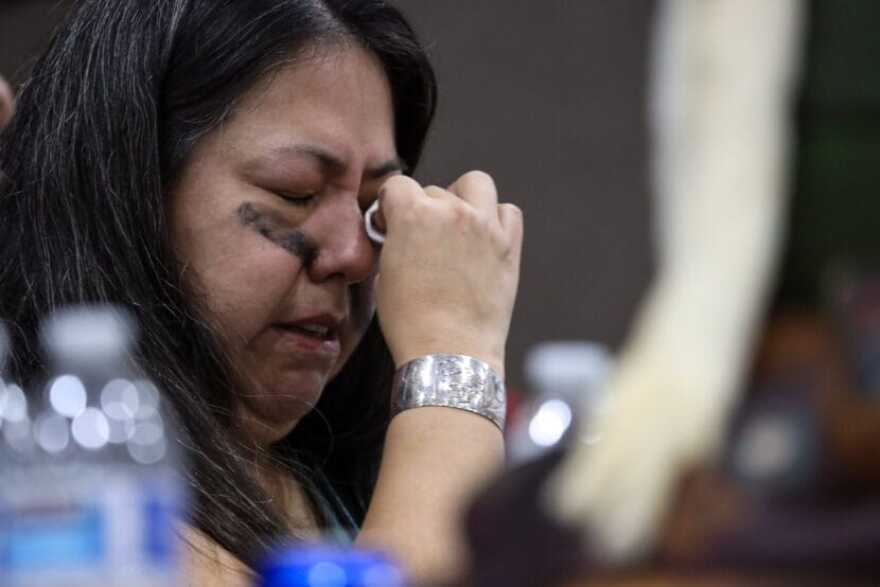Nearly 150 years ago, Angoon went up in flames.
On Oct. 26, 1882, the U.S. Navy bombarded the Lingít village on Admiralty Island, destroying clan houses, food caches, 40 canoes and leaving the community for dead.
But the community of Angoon didn’t die. And for decades, its residents have been asking for an apology from the federal government.
On Saturday, close to a century-and-a-half after the horrific shelling, that apology finally came.
X’ash Kugé ka Yaanasax Barbara Cadiente-Nelson’s grandmother survived the bombardment as a young woman.
“Can you imagine my grandmother, at 26, having to scramble and run with her family?” she said Saturday at the apology ceremony in Angoon. “And the fear, the real fear.”
According to written accounts of villagers who survived the bombardment, it all started because a Lingít shaman for the community was killed in a whaling accident.
U.S. government documents at the time claimed other Lingít villagers took two of the white whaling crew as prisoners, and demanded compensation of 200 blankets from the whaling company. Lingít accounts deny that prisoners were taken.
Then the Navy got involved. They said the village wasn’t owed anything, and in fact would be fined 400 blankets for taking prisoners.
“They scrambled to come up with blankets at the onset of winter. What were they going to do without blankets themselves?” Cadiente-Nelson said.
They only delivered about 80. As a result, the Navy attacked. Six children were killed in the shelling and an unknown number of others died in the following months from exposure and starvation.
Since the 1980s, representatives from Angoon have been asking for an apology. In June, the Navy announced they would issue one. They planned it with Angoon elders for the anniversary of the attack on Saturday.
The destruction of Angoon led Cadiente-Nelsonʼs grandmother to move to Juneau, about 50 miles away. Her kids were later sent to boarding school, where they weren’t allowed to speak Lingít.
Cadiente-Nelson said Angoon holds an annual memorial for the children killed during the bombardment. And every year, leaders ask those in attendance if anyone from the Navy is there to make an apology.
“And there was no reply. Today, it appears there will be a reply,” she said.
Though it’s a long time coming, Cadiente-Nelson said many in the community have mixed emotions about the apology.
“How do you restore a human being, how do you restore a family?” she said. “How do you restore a community who have been the target of annihilation?”
On Saturday, Lingít people from all over Southeast Alaska and beyond gathered in the Angoon High School gym to receive the apology. They danced in wearing regalia – button blankets, carved formline hats featuring bears, frogs, wolves and killer whales, with mother-of-pearl eyes and ermine pelt adornments.
U.S. Navy Rear Adm. Mark Sucato presented the apology to hundreds in the room and the thousands watching on a livestream.
“The United States Navy … apologizes on behalf of the United States Navy to all the Lingít peoples of Angoon for the pain, suffering and generational trauma inflicted by the bombardment of their village, acknowledges that the Lingít people of Angoon did not deserve nor provoke the bombardment and subsequent destruction of their village by U.S. Naval forces,” he read.
The gym filled with applause. One by one, starting with Deisheetaan leader Dan Johnson, Jr., clan elders responded to Admiral Sucato’s apology.
“None of us in this room will ever forget. We will take it to our graves, we will teach it to our children,” Johnson said. “For our house, we accept the apology that you’ve provided.”
Shgendootan George grew up with this story. She taught in Angoon for years and would teach her students about the shelling and burning of their village.
Apologies like this — that take ownership of colonial violence without justifications — confirm the true history of this story. And George said she was excited to teach this part of the history now, too.
“It doesn’t matter how many times I talk about it and how many times I talk with students about what happens like every time I tear up, like the emotions never go away and that feeling of injustice and disrespect, it’s gonna be amazing to be able to say the right thing happened, finally,” she said.
The celebration lasted into the early morning hours on Sunday.
The Navy also issued an apology last month for the burning and bombardment of the Southeast community of Kake in 1869. It’s expected to do the same for Wrangell.
Watch Sealaska Heritage Institute’s recording of the event here:




